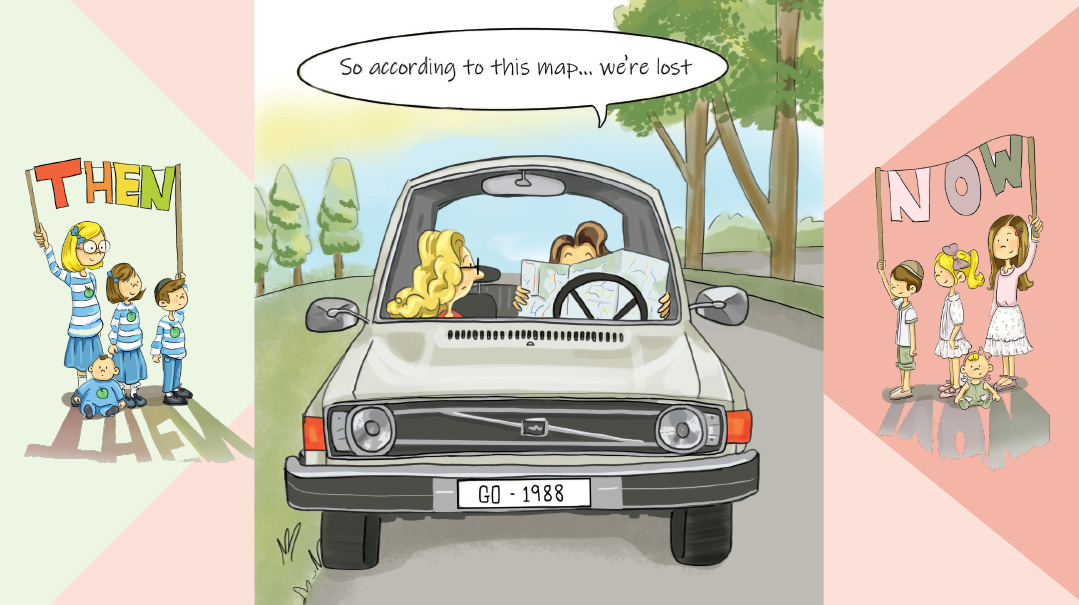A Heart as Big as the World
| October 24, 2023Rebbetzin Yitty Neustadt left an imprint on all whose lives she touched

Rebbetzin Yitty Neustadt grew up in a chassidish home. But when she and her siblings asked their father, Rabbi Ezriel Tauber, which chassidish group they belonged to, he always replied, “We are the Eibishter’s chassidim.” It was an environment saturated with Torah ideals, avodah, and chesed.
The family started off in New Square, then relocated to Monsey when Yitty was 16. Reb Ezriel was a successful businessman, and also the address for all kinds of communal and individual needs. He was the author of well-received seforim on Jewish thought, and a visionary whose life’s work — including the Shalheves organization he cofounded with Rav Shimshon Pincus, and Yeshivas Ohr Somayach, which he established in Monsey — improved the status quo for Klal Yisrael. Almost inevitably, in this atmosphere, his children absorbed a sense of Klal-consciousness.
At home, Mrs. Tauber, the family matriarch (who still lives in Monsey today), held the fort with complete commitment to her family. Her children marvel that “off-days” simply didn’t exist. Whatever was going on, she constantly worked to make home-cooked, plentiful meals and keep everything running smoothly. She raised a dozen children, ka”h, and accomplished chesed as well: She’d have donations of clothing dropped at their home, which she would dedicatedly wash, mend, and pack, to send to poor families in the USSR.
Even in that environment, the third child, Yitty, stood out, with a heart as big as the world. She was reserved as a girl, keeping herself in the background — neither outgoing nor looking to be popular. But the ahavas Yisrael, which others would later describe as “almost tangible,” was beginning to flower, rooted in her good heart and an intuitive grasp of the needs of people around her. In a world that had not yet openly embraced special needs children, her sisters remember that Yitty easily held hands with and visited them. In school, she was recognized by her fellow students and teachers as being unusually refined, with an unquenchable thirst for Torah and chesed. Tehillim mechulak was not yet a thing, but when she knew that someone sick needed tefillos, Yitty divided Sefer Tehillim among her fellow high-schoolers.
When she married Rabbi Aharon Dovid Neustadt, they settled in Monsey, on Acer Court right near her parents, and the budding talmid chacham learned at Kollel Machon Lehora’ah. Yitty was blessed with children immediately. She was still so young, a busy high-school teacher, and her house was slowly filling up with a handful of little ones. But this was a time when there was little talk about having one’s own space, one’s own needs, and self-care. The young Rebbetzin never seemed to feel that being a wife and partner to her choshuv and busy husband, raising a young family, teaching, and standing at her father’s right hand in his community and kiruv work meant she was doing enough. She made time for baalos teshuvah and other women who needed support or a listening ear, often hosting them in her home.
“One Friday, I came down from my Erev Shabbos nap to find two little girls sitting playing with my toys,” her oldest daughter, Malky Lefkowitz, describes. “I didn’t even realize they were Jewish.” Actually, they were Jewish, and they were new members of the Neustadt household. A young mother with two children had run away from an abusive non-Jewish husband and somehow found her way to Rabbi Ezriel Tauber for help. Rabbi Tauber sent the threesome, barely religious and traumatized, to stay with his daughter Yitty whom he viewed as his capable right hand. He knew she would be able to help them.
Another time, two teenagers from frum families in Eretz Yisrael who had dropped out of Yiddishkeit were welcomed in. They stayed for four years, sharing bedrooms with the little Neustadt girls, and were treated as daughters by the Rebbetzin until she walked them to their respective chuppahs. There was space for everyone in Rebbetzin Yitty’s home and heart, and her gift of communication revived them.
At His Side
“I am here to be a wife to my husband,” Rebbetzin Yitty Neustadt taught thousands of women in classes, lectures, and recorded shiurim about Jewish marriage. This commitment was at the heart of her life and guided her for the 46 years of her own marriage. In 1990, her husband, Rabbi Neustadt, received semichah to serve as a rav and dayan, and as part of this process, traveled to Eretz Yisrael to be farhered. The Torah environment in Eretz Yisrael was a powerful magnet; he felt he could learn and grow more there than in Monsey. When he shared this with the Rebbetzin, she packed her bags to move.
“My mother was expecting her eighth child, and the oldest was 12 and a half,” Malky Lefkowitz describes. “We lived near our grandparents and all her siblings, yet she was happy to uproot herself and come to Eretz Yisrael for the sake of my father’s learning and life mission. At the time, we had just one cousin, out of the entire extended family, who lived in Eretz Yisrael. But my mother was 100 percent happy to do it.” The family arrived during Chanukah of 1990 and were handed gas masks at the airport — the Scuds of the Gulf War were about to start falling. Rebbetzin Neustadt used to laugh about the fax machine she brought along with her to keep in touch with her family. It was confiscated by customs and sent back to America, since civilians were not allowed to own fax machines. Instead, she stayed up at night to keep in touch with her family — calls to the USA cost $2 a minute by day, and “only” $1 a minute at night.
Rebbetzin Yitty loved Eretz Yisrael unreservedly. She enrolled in ulpan to learn Hebrew and sent her girls to local Israeli Bais Yaakov schools. She wasn’t one of those who schlepped cases full of tuna fish and peanut butter and paper towels from America, but made her family at home in the new country by happily managing with Israeli products. While Rabbi Neustadt immersed himself in learning halachah and serving as a posek, the Rebbetzin forged friendships with English-speaking neighbors, other women who had moved to Yerushalayim. Every second week, she would take a turn to deliver the Shabbos afternoon ladies’ shiur in the Ezras Torah neighborhood, her new home.
Then, five years later, Rabbi Neustadt was asked to serve as rav and posek of Kehal Chassidim in Neve Yaakov. Today, this neighborhood is a vibrant hub of frum life, including several chassidish shuls, but in 1995, it was out of the way, far from central Yerushalayim, and the Neustadts were among a tiny handful of American chassidish families. Rebbetzin Yitty relocated her home once again. Her family was growing, yet just as her sincerity, soft-spoken charm, and gift of empathy had been a magnet in Monsey and Ezras Torah, they drew women to her in Neve Yaakov.
The shiurim started small: Classes given around dining room tables to women who wanted to hear hashkafah and practical wisdom and sensed that the Rebbetzin had found a clear path through life’s mazes. Both baalos teshuvah and frum-from-birth women who observed the Rebbetzin or heard her speak realized that she had a real and unambiguous understanding of the role of a Jewish woman — and lived it.
Speaking English, Yiddish, and Hebrew fluently, Rebbetzin Yitty was soon invited to speak in high schools and seminaries across a wide range of schools — from insular Yerushalmi to Satmar, Belz, Vizhnitz, and Litvish Bais Yaakovs. Girls and women connected to the divrei Torah and midrashim, the mussar and pesukim, delivered with the soft, kind voice and genuine femininity of the almost-anonymous speaker (who was sometimes advertised only as Mrs. Y. N., or Mrs. Neustadt). Even the most sheltered knew they could trust her authentic Torah perspective and marriage advice.
At the same time, as Rabbi Tauber’s Shalheves organization offered Torah and hashkafah to the masses, Rebbetzin Neustadt continued as his right hand, working with her father when he came to organize inspirational Shabbos seminars in Eretz Yisrael, and spreading his ideas in shiurim for women. Even after a busy week of their own duties and teaching, the Neustadts didn’t feel they deserved a quiet Shabbos to catch up on sleep. Instead, they’d pack up to give shiurim and join a Shalheves seminar.
For years, Rebbetzin Neustadt made her way to Tel Aviv to give a weekly lecture for the Shorashim kiruv organization. One week, she arrived in the lecture room to find a note at her place. It read, in Hebrew, “Rabbanit, you are not practicing what you preach about tzniyut.” The writer continued, explaining that in her opinion, one of the Rebbetzin’s items of clothing did not match the standards she described in her classes. Despite the fact that her clothing had been objectively fine and in accordance with the halachos of tzniyus, from that day on, Rebbetzin Neustadt stopped wearing the style in question, taking even an anonymous note as a prod to self-improvement and emes. She continued teaching these secular groups until the organization insisted they needed to post videos of her talks. While she’d permit audio recordings, she felt that videos available for the public crossed a red line. Rebbetzin Neustadt left.
Although her own mother wears a sheitel, Rebbetzin Yitty didn’t make that her own ceiling in observing the mitzvah of kisui rosh. She covered her sheitel, first with a hat, then a tichel, growing and changing according to her husband’s preferences. Her own daughters’ headwear range from sheitels to covered sheitels to tichels, but Malky Lefkowitz says that her mother never expected them to follow her hiddurim, telling them that they should cover their hair in the manner their husbands preferred.
In time, Rabbi Neustadt became the last word on halachah for many, as well as a highly regarded chassan teacher and shalom bayis expert. The Rebbetzin held many women and their marriages together with her own Torah-based advice and support. They traveled as far as Australia together to give shiurim and sit with individuals and couples, building homes and families with Torah-true advice. Always ready to refer to professionals when needed, she kept handwritten lists of recommended therapists as well as remedial teachers and medical practitioners so that she could do the chesed of guiding people to the right help.
Endless Giving
A yungerman from a very sheltered community in Yerushalayim came to consult with Rabbi Neustadt about his faltering shalom bayis. He was in a very problematic situation: His wife had emotional issues and refused to go anywhere for help. The Rav would consult with the Rebbetzin when they sat down together at the end of the day, and when he asked her what she thought he could do with this poor young man, she took the address and said she’d see what she could do.
It wasn’t long after that that there was a knock on this couple’s door during the day. Rebbetzin Yitty Neustadt was at the door. She explained to the lady that she was out shopping in the area and really needed to use the bathroom. Could she refuse? After using the bathroom, the Rebbetzin washed her hands and sat down to say asher yatzar carefully. Then she asked the lady of the house her name and began to chat. Soon, the lady was speaking about her problems, and Rebbetzin Neustadt arranged that she would come to Neve Yaakov to speak things over. She had managed to get the door open a crack so that the couple could be helped with their challenges.
Rebbetzin Yitty’s kindness and hasagos in chesed extended to embrace so many women and their families.
In the aftermath of her passing, her sisters, rebbetzins themselves, marveled that she had never said that the problems people brought to her were too much to handle. How could just one woman, with 24 hours in her day, make so many phone calls of chizuk and carry so many women with her unconditional love and support? It was because when it came to chesed, she was proactive, not reactive. She actually looked to give people encouragement and help, and didn’t make anyone feel like a “taker.”
The stories poured in. A lady said she remembered asking endless questions about Judaism to the Rebbetzin in the Neustadt kitchen back in Monsey, while watching the Rebbetzin bake challah and kokosh cake. She’d kept in touch with the Rebbetzin along her religious journey for 45 years. A woman in Neve Yaakov, a baalas teshuvah, recalled that when she came home from the hospital after giving birth, a nourishing, catered meal for the whole family was delivered from Hadar Geulah, one of Yerushalayim’s well-known eateries. The note wished the entire family mazel tov, with love from Rebbetzin Yitty Neustadt. The meal deliveries continued to sustain them for an entire month.
A local family had a new baby and didn’t know how to manage with their autistic child. Rabbi and Rebbetzin Neustadt, who still had nine children living at home at the time, took this boy in for a while until his mother had recovered and felt she could manage again.
Another woman, also from a non-religious family, who had a newborn and several tiny kids, said she had been invited to the Neustadt home for a Shabbos. The Rebbetzin bought new toys and treats for all the children and pampered her guest with delicious food and a special time. She left feeling like a newly energized person.
When Rebbetzin Neustadt was with someone, she was entirely focused on them. If she was reading a bedtime story to a child, her focus was exclusively on that child, and if she was attending a simchah, she was totally present there, letting the baal simchah feel nothing of her efforts to get there, or of any other pressures in her day. So many women mentioned at the shivah not only how she carved out time for them in her packed schedule, but how she looked into their eyes while she spoke to them. Once, at a wedding made by her mechutanim, Rebbetzin Neustadt immediately went over to her daughter-in-law. Her relatives still remember the way her eyes went straight to her daughter-in-law’s eyes — not to her gown, her sheitel, or her made-up face — as she wished her mazel tov and expressed her happiness. Afterward, she complimented her appearance, but primarily, she saw the person; she looked for, and saw, the soul.
A year ago, when her daughter Malky made an upsheren in Meron, Rebbetzin Neustadt arrived on a Friday laden with special treats for the simchah and spent a beautiful Shabbos there with Malky’s entire family. At the shivah, another Neustadt daughter, who lives in Teveria, reminisced about a wonderful Thursday her mother had spent with her recently, checking out a hotel for a Shalheves seminar together, enjoying her family’s company, and staying over. The two sisters pieced the dates together and realized that their mother had made her way up to Teveria, spent Thursday day and night in one daughter’s home, and then continued to Meron for Shabbos, to be present at another daughter’s simchah, without mentioning to either one that her trip had another part. “When she came to my simchah, my mother was completely mine,” Malky marvels. “She did not mention anything about my sister or her stop in Teveria.”
Embracing Them All
With all of her deep caring for the needs of Klal Yisrael — whether she was teaching, doing chesed, or supporting individuals in their journeys toward healing and shalom bayis, Rebbetzin Yitty never neglected her number one calling: Being a loyal wife and caring mother. There were 13 Neustadt children — one son sadly passed away eight years ago. “I am not making Play-Doh,” the Rebbetzin used to say. “I am not here to mold my child into a form, or to gain kavod from his success. A mother is the earth for her child to grow in.”
The Rebbetzin enjoyed shopping for new clothing, took care of her skin and appearance, loved flowers, and was always fully dressed. She didn’t own a Shabbos robe, and slippers were not her usual attire, because she was never lounging, but always active, rising early for shul on Shabbos mornings. Malky says she cannot remember her mother instructing her to daven, or even bentsh. When Malky asked for advice for raising her own children, her mother guided her, “Malky, be. Don’t say.”
Her close relatives point out her emphasis on a mother’s duty to care for herself, body as well as soul. Malky remembers that one particular Israeli audience became frustrated with her mother’s talks about self-care, sleep, and healthy nutrition, with a woman calling out, “Rabbanit, enough about gashmiyut, we want to hear about ruchniyut!” But of course, it was all ruchniyut to the Rebbetzin.
Another time, a woman spoke up during the Rebbetzin’s shiur, saying, “What would be the point of me spending ten years of my life peeling and cutting and squeezing all those vegetables in order to eat healthily, in order to extend my life by ten years?”
Rebbetzin Neustadt’s immediate response was, “Eating healthfully will not extend your life for a minute beyond what Hashem has decided for you, but it will ensure that the years and days you have are full of health and energy.”
Never Stopped Learning
At the shivah for Rebbetzin Neustadt, women from the dati leumi community came alongside black-shawled Meah Shearim ladies to comfort the family and pay tribute to a beloved mentor. Among the stream of visitors, the director of Kol Halashon arrived. “Even at this moment, thousands of phonelines are alive listening to the Rebbetzin,” he said. “From South Africa to Europe and in between, Rebbetzin Neustadt was the most listened-to contributor on Kol Halashon.” She may be suddenly gone, but her guidance for Jewish women is still here in three beautiful seforim and hundreds of recorded classes.
One of her sisters recalls how, as little girls, the Tauber daughters would sit around their father on Shabbos afternoons to learn. “We all got a clarity in hashkafah from my father,” one of the sisters explains, “From when we were little, my father sat us down with him. In the summers we learned Pirkei Avos, and in the winter, a sefer. Although we didn’t have much cheishek at the time, I can still remember things we learned. Yitty took my father’s teaching many steps further, gaining clarity and depth on her own, and passing it on.”
When Rabbi Tauber opened Yeshivas Ohr Somayach in Monsey, and its women’s branch, Netzach Yisroel, his daughters went along to drink in all the lectures he offered the students. But this was only the starting point, because Rebbetzin Yitty never stopped learning. She loved the shiurim of Rebbetzin Tziporah (Heller) Gottlieb, and when she finished Mrs. Rut Shemesh’s course on how to teach and guide kallahs, she loved it so much that she took the course again. Her girls remember their mother going to her room after the Shabbos seudah with a towering pile of seforim in both Lashon Hakodesh and English.
But when she suspected ideas were not purely Torah, she conquered her thirst to learn and took a step back. Chochmah was valid among non-Jews and their sources, but it wasn’t Torah, and it wasn’t for her. “My sister wanted to take more courses and study more. But sometimes she would start a course and then smell something was not purely Torah, that the material had a touch of chochmah chitzonis. She would drop the course, however fascinating,” her sister explains. Just as many women relied on Rebbetzin Neustadt to recommend “kosher” therapists and professionals, rebbis and rabbanim would send people to her to check that the educational or psychological courses of study they wanted to pursue were “kosher” and not based on sources contrary to our mesorah.
The Rebbetzin’s third sefer, Veyitnu Lecha Kesser Meluchah, discusses themes of marriage and explains the privilege and the value of bringing “the Eibishter’s children” into This World. In the introduction, Rebbetzin Neustadt writes that spreading appreciation of the precious gift of mothering a Jewish child has been her dream during her whole life.
Last year, at the end of the winter, Rebbetzin Neustadt sent this manuscript to her brother in Monsey to check. His opinion was that the content was excellent, but it could use some more polishing. But she declined, with an inexplicable sense of urgency: “I want to get this out as soon as possible.” The sefer would be her last work — and a lasting legacy.
(Originally featured in Family First, Issue 865)
Oops! We could not locate your form.







